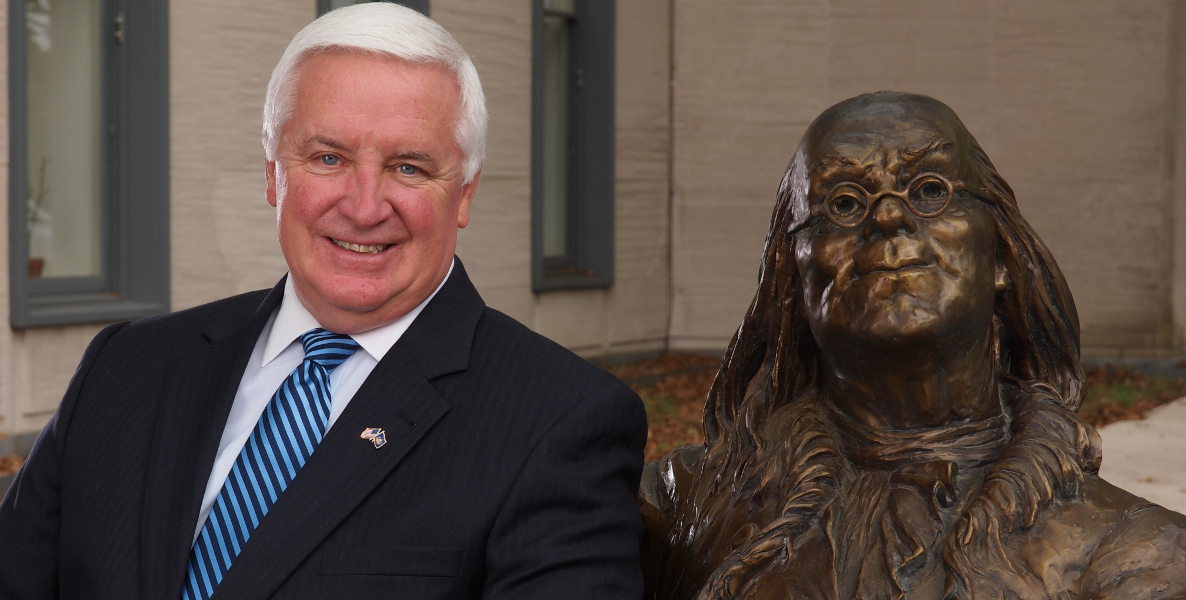The possibility of curing cancer is closer than ever — thanks in part to a University of Pennsylvania researcher.
An October 15 article in The New York Times touted the results of Dr. Carl June’s groundbreaking study: 30 leukemia patients who were weeks from death had been treated with June’s T-cell therapy, in which the patient’s cells are genetically modified so his or her own immune system can fight the disease. Six months later, 23 of those who had been facing certain death were still alive — and an astonishing 19 had gone into complete remission.
Center City philanthropist and entrepreneur Richard Vague endows June’s chair at Penn and has donated more than $5 million over the last three years to spur the doctor’s cutting-edge work. Buoyed by June’s results, Vague sat down early last spring with Governor Tom Corbett, as well as, in separate meetings, Secretary of Health Michael Wolf and Lieutenant Governor Jim Cawley. He pitched a big idea: The state of Pennsylvania could become a world leader in curing cancer.
“They very well may have found the cure for leukemia at Penn Medicine,” Vague, a courtly Texas transplant and a fixture on Rittenhouse Square, told the politicians. “And now they’re extending that breakthrough in new trials to brain cancer, ovarian cancer, breast cancer, pancreatic cancer. It’s something that could be a gift to the world, but it could also be a jobs revolution in southeastern PA.”
Governor Corbett, elected in 2010 to — essentially — say no to new spending, entered this election season in need of an uplifting, affirmative case. Waging war against cancer could have been it. Too bad he missed the opportunity.
Vague suggested that Corbett match his own contribution of $5 million. Not only would this advance the cause of eradicating cancer, it would be a brilliant PR move for Corbett, who was facing a challenging reelection: A press conference in which the governor boldly proclaims the Keystone state as front and center in trying to cure cancer could be the modern-day equivalent of John Kennedy’s challenge to go to the moon within 10 years.
Or, more to the point, it could echo Richard Nixon’s popular 1971 call to wage a war on cancer. “The same kind of concentrated effort that split the atom and took man to the moon should be turned toward conquering this dread disease,” Nixon said upon signing the National Cancer Act.
We’re still waiting for that announcement — and the ensuing plaudits (maybe even votes?) that would have followed. “The governor(?) says it’s a powerful idea,” says Vague. “Everyone’s been very receptive.”
So why the delay?
Government tends to move slowly. And it moves even slower in an election year dominated by serious budgetary constraints. But to Vague’s way of thinking, June and his team have a better chance of crossing the proverbial goal line with the state as lead blocker. And time is of the essence, because other states are getting in the game. Texas, for example, has aggressively floated bonds to finance cancer research.
“The budget issues are real and I don’t pretend to understand the mechanism,” Vague says. “But this is potentially the cure for cancer we’re talking about. This is the iconic breakthrough we’ve been hoping for and thinking about all our lives.”
“This is an iconic breakthrough,” Vague says of the cancer research at Penn. “It can be a gift to the world and a jobs revolution in southeastern PA.”
Governor Corbett, elected in 2010 to — essentially — say no to new spending, entered this election season in need of an uplifting, affirmative case. Waging war against cancer could have been it. Too bad he missed the opportunity.
Vague knows this is a long game. He’s met often with Tom Wolf and has even read Wolf’s doctoral dissertation: “Congressional Sea Change: Conflict and Organizational Accommodation in the House of Representatives 1878-1921.” (Vague is an inveterate reader. Check out his blog, delanceyplace.com.)
“My favorite period in history is the late 1800s, early 1900s,” Vague explains, before breaking into a wide smile. “So Wolf had me at hello.”
Vague plans on presenting his idea to Wolf after tomorrow’s election.
![]()
RELATED



